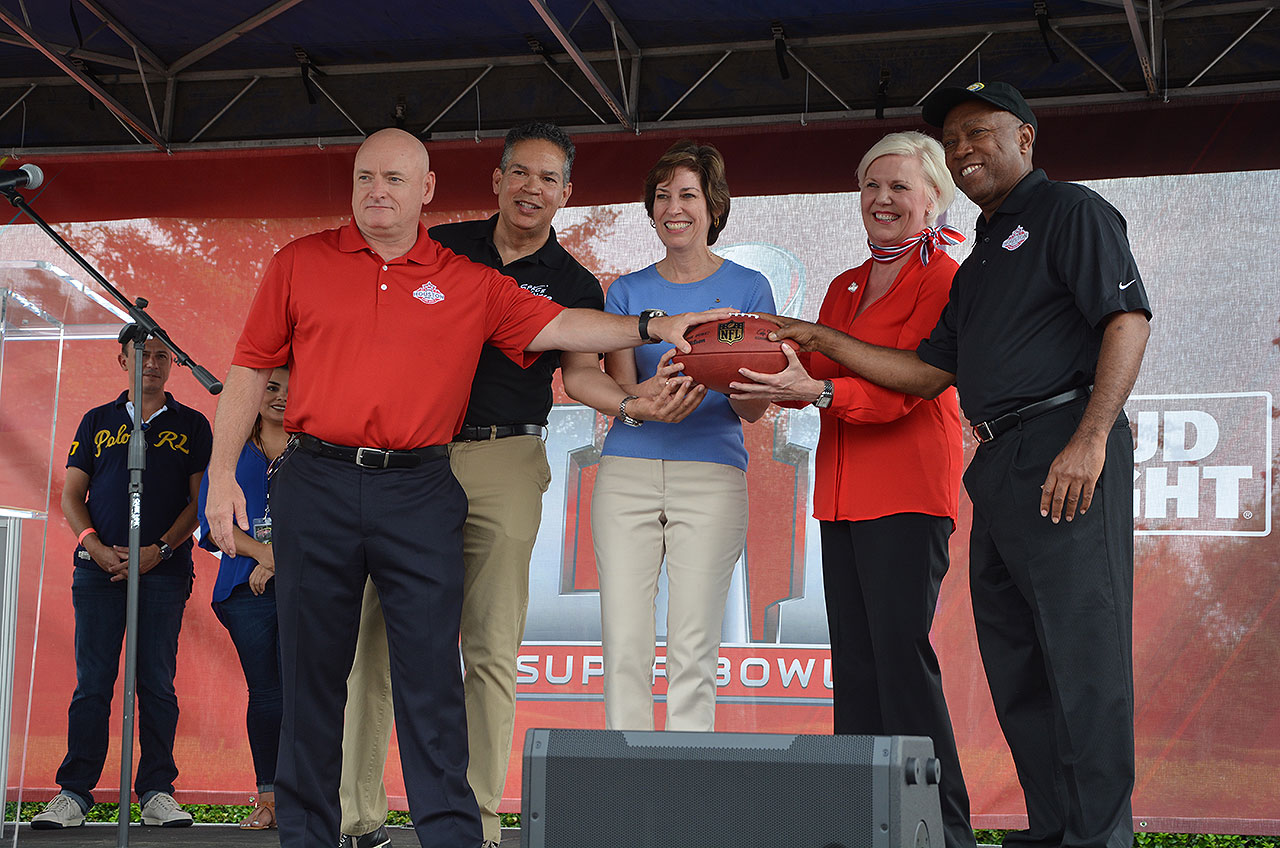Hand-Off of Space-Flown Football Launches Pre-Super Bowl Tour in Houston

HOUSTON — A football flown for five months aboard the International Space Station has now become a symbol of the next Super Bowl to be played in Houston.
Astronaut Scott Kelly, who returned from a record 340-day expedition on the orbiting outpost earlier this year, handed off the flown football at Space Center Houston on Saturday (Aug. 27).
"This really is an out of this world acceptance of a football," said Sallie Sargent, the president and CEO of the Houston Super Bowl Host Committee, during the "Touchdown Tour" opening event. [9 Weird Things That Flew on NASA's Space Shuttles]
Kelly passed the football to Sargent, who accepted it along with Houston Mayor Sylvester Turner, Ellen Ochoa, NASA Johnson Space Center director, and William Harris, Space Center Houston's CEO and president.
"This ball is a symbol not only of Super Bowl LI coming to Houston, but a symbol of the great partnership we have with NASA and the Johnson Space Center. They were our first friends once we were awarded the game, and nothing says 'future' more than NASA and space exploration," said Sargent.
The theme for Super Bowl LI (51), to be played on Feb. 5, 2017 at NRG Stadium, is the future of the game, including a focus on space exploration.
"Football and space? How much better could it get, right?" said Ochoa, who flew aboard four space shuttles missions in the 1990s.
Get the Space.com Newsletter
Breaking space news, the latest updates on rocket launches, skywatching events and more!
The flown football handoff marked the launch the first of a series of Touchdown Tour events planned by the Houston Super Bowl Host Committee to involve the community in the countdown to the big game. According to Sargent, the space station-flown football may go on display at the future Touchdown Tour events.
Before passing the ball, Kelly joked about how the football was prepared for its journey back to Earth.
"When we were sending it home, it didn't look like this," he said. "I figured in space you have a limited air supply, so I actually deflated it so we could keep the air on the space station."
"Because in space, you never know when you are going to need some extra air," Kelly remarked.
In addition to the handoff ceremony, the Touchdown Tour at Space Center Houston included a robotic football game, expert panel discussions about past, present and future of space exploration and opportunities for the public to meet several other astronauts. In addition to Kelly and Ochoa, the event included space shuttle commanders Brian Duffy, Lee Archambault and Mark Polansky, spacewalker Jerry Ross and space station flight engineer Clayton Anderson, who also flew a football on the orbiting laboratory in 2007.
"In space, you can play by yourself," described Anderson. "You can kick off and receive it, and you can fly with it and pass it to yourself."
"You can throw it from one end of a space station module and float down and catch it on the other end," he said.
Kelly shared a similar enthusiasm for zero-g football.
"It was great cause I could throw it really, really far, unlike right now," Kelly said. "It was fun to play with on board the space station."
Follow collectSPACE.com on Facebook and on Twitter at @collectSPACE. Copyright 2016 collectSPACE.com. All rights reserved.
Join our Space Forums to keep talking space on the latest missions, night sky and more! And if you have a news tip, correction or comment, let us know at: community@space.com.

Robert Pearlman is a space historian, journalist and the founder and editor of collectSPACE.com, a daily news publication and community devoted to space history with a particular focus on how and where space exploration intersects with pop culture. Pearlman is also a contributing writer for Space.com and co-author of "Space Stations: The Art, Science, and Reality of Working in Space” published by Smithsonian Books in 2018.In 2009, he was inducted into the U.S. Space Camp Hall of Fame in Huntsville, Alabama. In 2021, he was honored by the American Astronautical Society with the Ordway Award for Sustained Excellence in Spaceflight History. In 2023, the National Space Club Florida Committee recognized Pearlman with the Kolcum News and Communications Award for excellence in telling the space story along the Space Coast and throughout the world.










